![]()
|
J
H Weatherby & Sons (Ltd) |
Location and period of operation:
|
J H
Weatherby & Sons (Ltd) |
Tunstall Hanley |
1891 1892 |
1892 April 2000 |
Earthenware manufacturer at
Tunstall (1891) and then at Hanley, Stoke-on-Trent, England.
|
NOTE: The Weatherby FALCON Works in Hanley had no connection with the following companies:
Thomas Lawrence pottery company in Longton who also used the name 'Falcon Ware'
The Falcon Works of W. H. Goss in Stoke

Weatherby
J. H., & Sons,
earth'ware manufacturers
Falcon Pottery
from..... 1907
Staffordshire Sentinel
'Business Reference Guide to The Potteries, Newcastle & District'
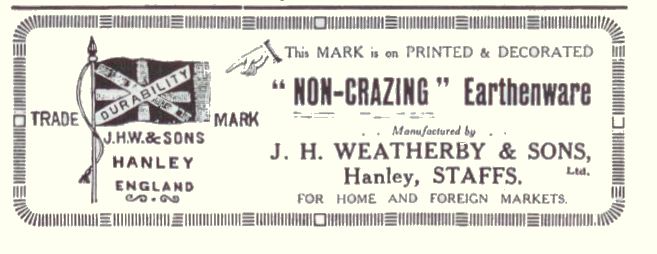
"Non-Crazing"
Earthenware
manufactured by
J. H. Weatherby & Sons, Ltd.
1917 advert
The Pottery Gazette Diary, 1917
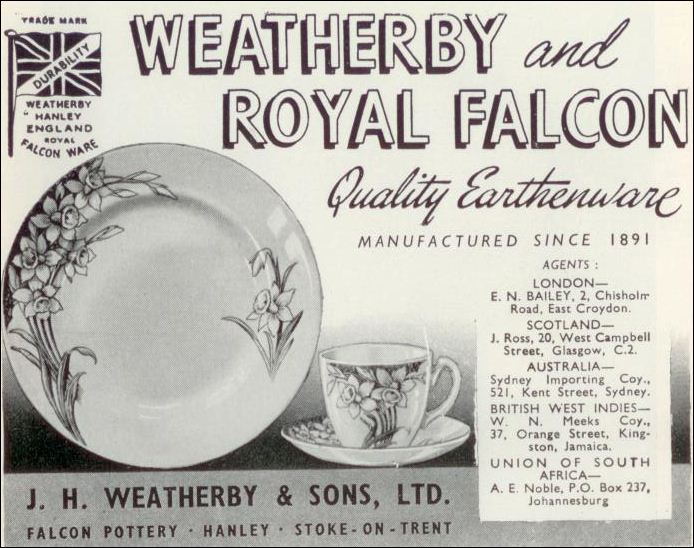
Weatherby and Royal Falcon
Quality Earthenware
J. H. Weatherby & Sons, Ltd.
1947 advert
The Pottery Gazette Directory, 1947
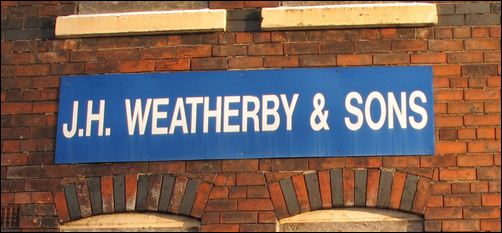
J H Weatherby & Sons

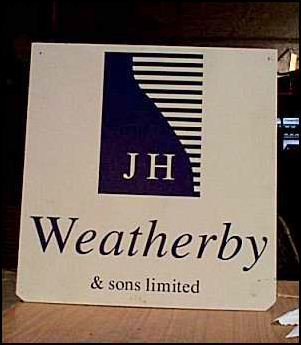
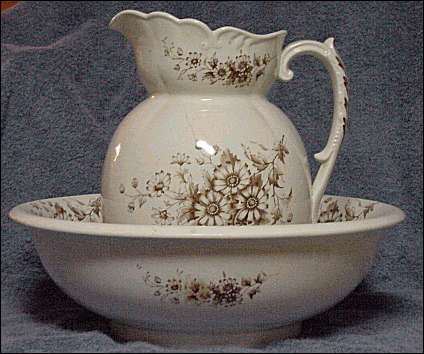 Wash bowl and jug in the Daisy pattern produced by Weatherby in 1891 when they were based at the Pinnox Works in the town of Tunstall |
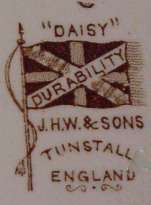 Durability J. H. W. & Sons Tunstall England |
Printed mark used 1891, early
1892 only
when Weatherby were at Tunstall
In 1892 the business moved to the nearby town of Hanley
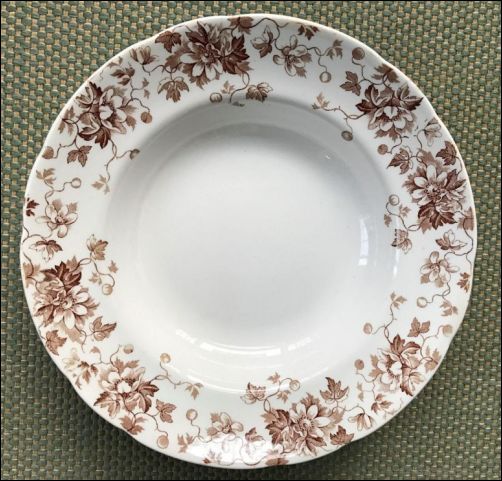 bowl in the Edgevale pattern |
the
registration number
227959 shows that the pattern was registered on the |
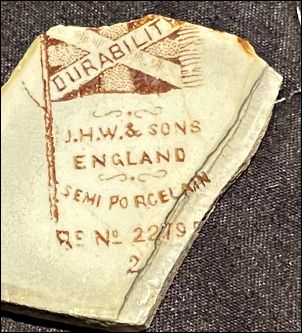
courtesy: McKenna Varney |
In 1892 the Weatherby business moved
from Tunstall to
the nearby town of Hanley
it appears that early production from the Falcon Works were initially marked
'England'
without the place name 'HANLEY'
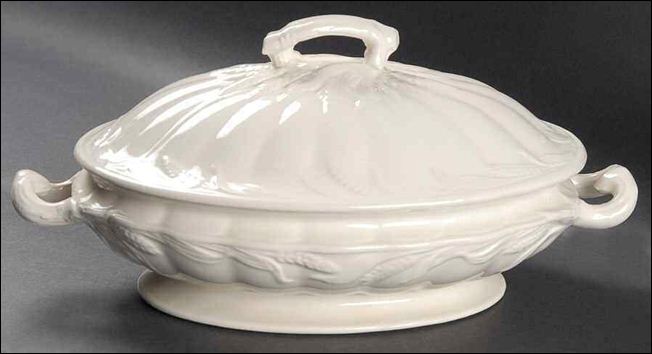
White ironstone casserole in
the Wheat design
marked - Royal Crownford
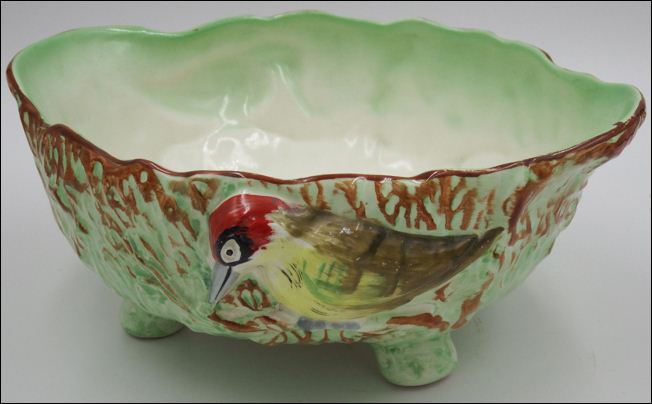
Woodpecker salad bowl
marked - Royal Falcon Ware
carries the registration number
793820
which was first registered in 1934
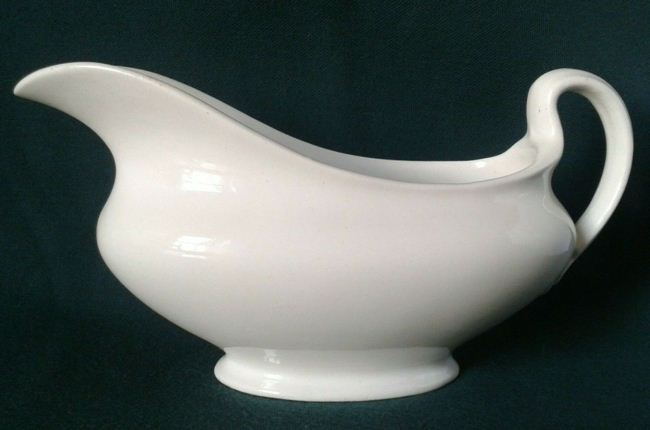
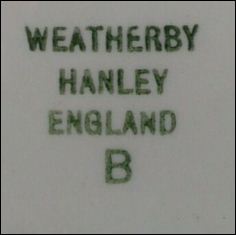
sauce boat produced under the Wartime
Concentration Scheme
marked with the letter B
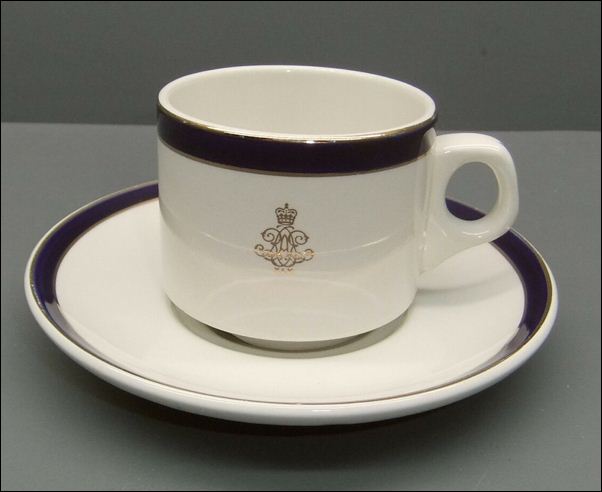
crested catering ware
produced in the 1980s
Weatherby
Zookies
"People
who buy one, buy another and another and buy them for their friends
too!"
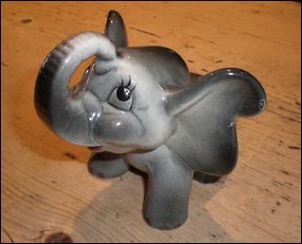 |
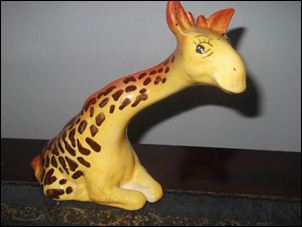 |
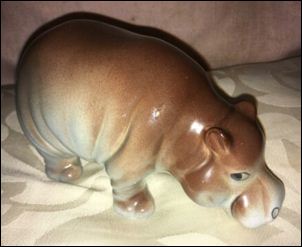 |
| In the 1950s a number of pottery companies began to make a range of animals hoping that people would go on to collect several in a set. Weatherby produced a series of sturdy comical animals which they called Zookies. An advertising leaflet from 1957 read "People who buy one, buy another and another and buy them for their friends too!". Weatherby made Zookies into the 1960s, but by 1970 production had ceased. |
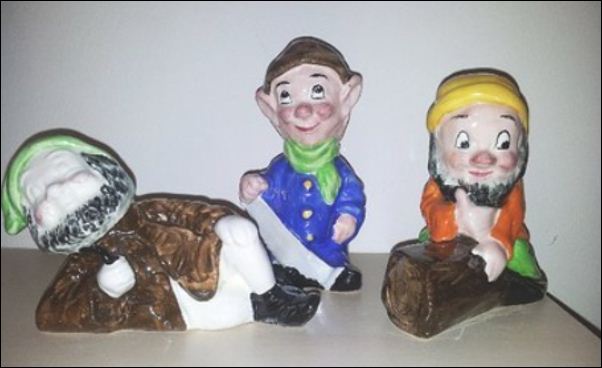
Weatherby Dwarfs
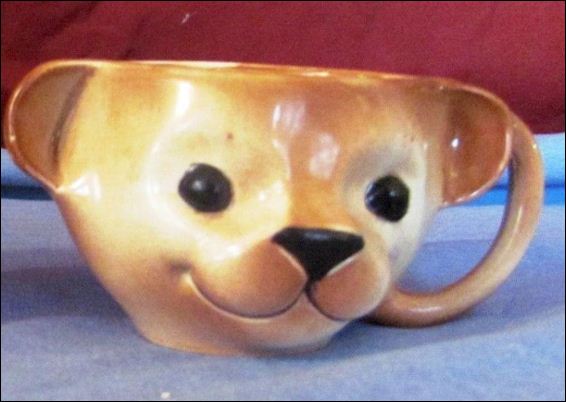
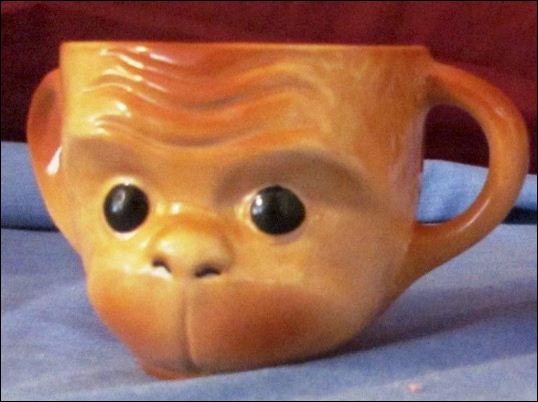
Weatherby
Chuckleheads were a range of cups and saucers shaped like animals
Marks used on ware for identification:
J H W & SONS
WEATHERBY
Trade Names:
DURABILITY
used from 1891+
FALCON WARE
introduced in
1925+
FALCONA WARE
the addition of
the prefix 'Royal' appears to have been introduced in the early 1930s
there is no official Royal connection - this was a marketing tool
ROYAL FALCON WARE
ROYAL FALCON IRONSTONE
ROYAL CROWNFORD
ROYAL CROWNFORD IRONSTONE

Durability
J.H.W. & Sons
Tunstall
England
DAISY is the pattern name
Printed mark used 1891, early
1892 only
when Weatherby were at Tunstall
In 1892 the business moved to the nearby town of Hanley
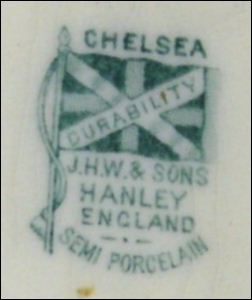
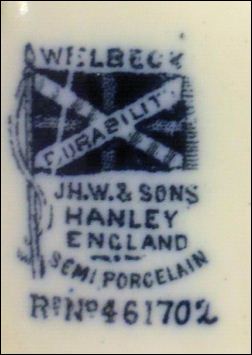
J.H.W. & Sons
Hanley
England
Printed mark introduced 1892 and
used until c 1925 when 'Falcon Ware' was added
used with and without 'Semi Porcelain'
'Chelsea' and 'Welbeck' were pattern names
the number 461702 shows that the
pattern was first registered
in 1905
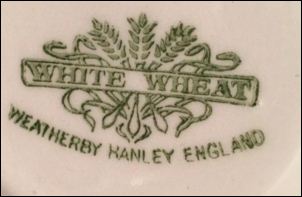
White Wheat
Weatherby Hanley England
mark used on white ironstone ware
White Wheat ironstone, without
the 'Royal Crownford" name
date uncertain
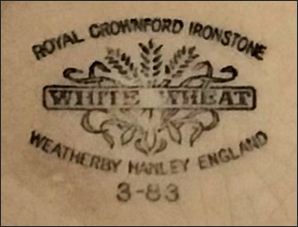
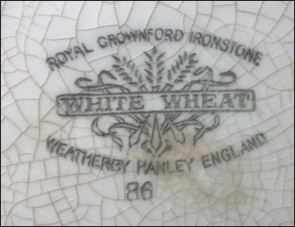
Royal Crownford Ironstone
White Wheat
Weatherby Hanley England
these two examples have manufacturing date marks of March 1983 and 1986
photos courtesy: Helena Stens
|
Wheat: J.H. Weatherby and Sons Limited "The Wheat pattern is today [1985] manufactured by J.H. Weatherby and Sons at its Falcon Pottery in Hanley. The firm began producing the pattern in 1970, taking over from Arthur J. Wilkinson Limited of Burslem. Since Weatherby and Sons acquired the blocks, cases and master moulds from Wilkinson, there is likely very little difference between the patterns produced by both companies. The manufacturing materials were actually purchased by a New York-based firm, Crownford Gifts (hence the ROYAL CROWNFORD IRONSTONE in the mark), when Wilkinson ceased operation, and Weatherby and Sons was then requested to produce the pattern. In Canada the distributor of the pattern is Frederick Dickson and Company Limited, which, prior to 1970, supplied the Wilkinson-made Wheat pattern to Canadian stores."
See details of Crownford China/Giftware |
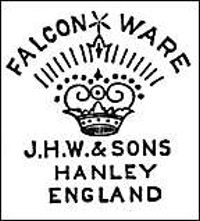
Falcon Ware
J H W & Sons
Hanley
England
1928+
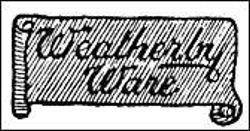
Weatherby Ware
1936+
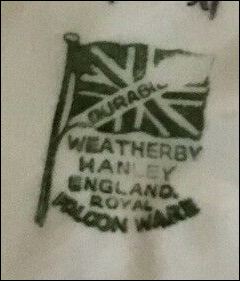 |
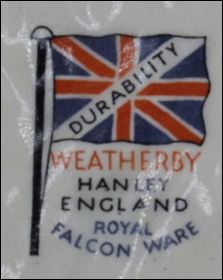 |
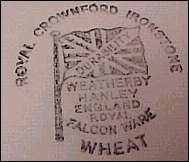 |
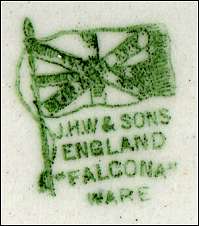 |
Typical variations of marks using 'Royal Falcon Ware' and 'Falcona Ware'
c.1934+

Weatherby
Hanley
England
B
mark used on ware produced
under
the Wartime Concentration Scheme
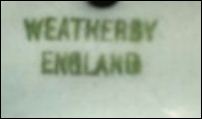
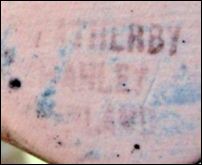
marks used on the Weatherby
animals called 'Zookies'
introduced in the 1950s and continued in the 60s
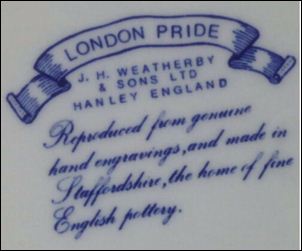 London Pride J.H. Weatherby & Sons Ltd Hanley England Reproduced from genuine hand engravings, and Made In Staffordshire, the home of fine English pottery |
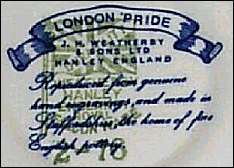
London Pride were a series of blue & white transferware souvenir ware pieces of London landmarks some pieces have the London Pride mark overstamped on the regular Weatherby mark on this example the "2-76" is the date of manufacture - Feb 1976 |
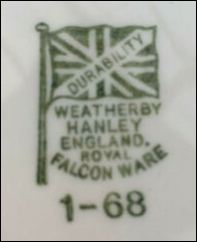
Weatherby Hanley England Royal Falcon Ware "1 68" is the date of manufacture - Jan 1968 |
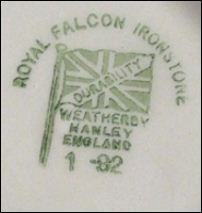 Royal Falcon Ironstone Weatherby Hanley England "1 92" is the date of manufacture - Jan 1992 |
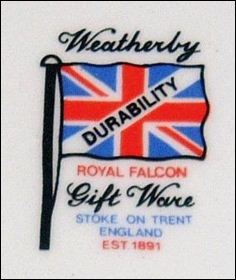
Weatherby
Royal Falcon
Gift Ware
Stoke-on-Trent
England
Est 1891
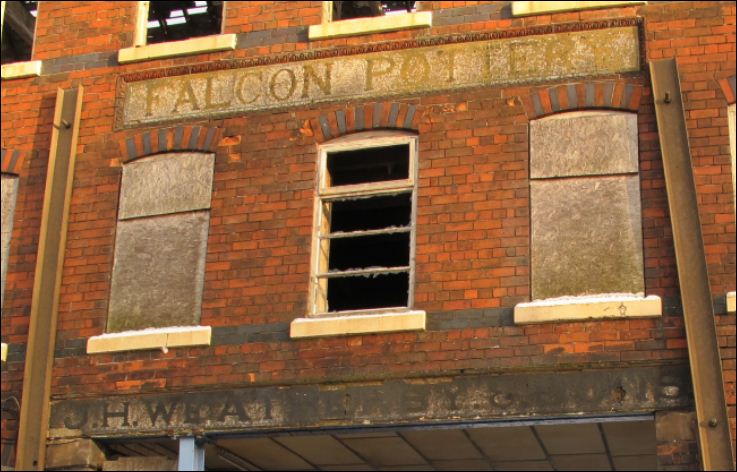
FALCON POTTERY
J H Weatherby & Sons

The Weatherby Falcon Works -
from a 1913 letterhead
- click
for more on the Falcon Works -
|
Another famous pottery to close
Article from the Sentinel
Newspaper April 27th 2000 One of the last remaining family-owned pottery firms is to close after more than a century. J H Weatherby and Sons in Hanley is currently being run down and is will soon cease trading after 109 years. Its chairman, Christopher Weatherby, the great-great grandson of company founder John Henry Weatherby, today blamed cut-throat competition in the hotelware business for the firm's decline. At its height the company employed 200, but the figure was down to 50 at the turn of the year and now stands at 10.
The company was founded in Tunstall in 1891 and moved to Hanley the following year. It first made domestic ware such as basins and ewers, later moving into tableware and giftware.
The firm also entered the market for hotelware – leading ultimately to
its downfall.
Mr Weatherby pointed to tough competition from home and abroad for the
company's current problems. The 59-year-old added: ‘‘The hotel part of it was more fragmented. That has been changing and it's relying on more standard patterns.'' Mr Weatherby admitted the firm had even considered importing cheaper products from abroad, but was deterred because of the high volumes needed to make the operation profitable.
This route was controversially followed by another failed family firm, James
Sadler and Sons. Mr Weatherby also partly blamed a planning issue dating back to the early 1970s, which ‘‘blighted'' the family firm and restricted investment in it. |
Questions, comments, contributions? email: Steve Birks